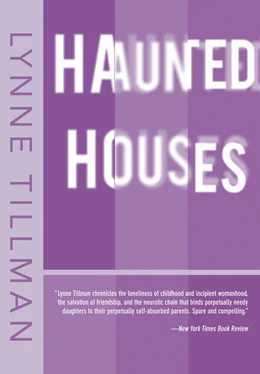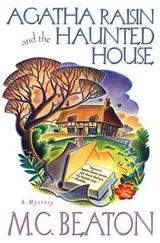Lynne Tillman - Haunted Houses
Здесь есть возможность читать онлайн «Lynne Tillman - Haunted Houses» весь текст электронной книги совершенно бесплатно (целиком полную версию без сокращений). В некоторых случаях можно слушать аудио, скачать через торрент в формате fb2 и присутствует краткое содержание. Год выпуска: 2011, Издательство: Red Lemonade, Жанр: Современная проза, на английском языке. Описание произведения, (предисловие) а так же отзывы посетителей доступны на портале библиотеки ЛибКат.
- Название:Haunted Houses
- Автор:
- Издательство:Red Lemonade
- Жанр:
- Год:2011
- ISBN:нет данных
- Рейтинг книги:5 / 5. Голосов: 1
-
Избранное:Добавить в избранное
- Отзывы:
-
Ваша оценка:
- 100
- 1
- 2
- 3
- 4
- 5
Haunted Houses: краткое содержание, описание и аннотация
Предлагаем к чтению аннотацию, описание, краткое содержание или предисловие (зависит от того, что написал сам автор книги «Haunted Houses»). Если вы не нашли необходимую информацию о книге — напишите в комментариях, мы постараемся отыскать её.
, Tillman wries of the past within the present, and of the inescapability of private memory and public history. A caustic account of how America makes and unmakes a young woman.
Haunted Houses — читать онлайн бесплатно полную книгу (весь текст) целиком
Ниже представлен текст книги, разбитый по страницам. Система сохранения места последней прочитанной страницы, позволяет с удобством читать онлайн бесплатно книгу «Haunted Houses», без необходимости каждый раз заново искать на чём Вы остановились. Поставьте закладку, и сможете в любой момент перейти на страницу, на которой закончили чтение.
Интервал:
Закладка:
They were at a party and Grace was thinking about ugliness, beauty, and anarchy, then found herself talking to, or listening to, an ugly guy who was telling her his life story. “I started going to therapy after I shot my best friend. We were living in California, and he was driving me crazy. It was going on for two years, so finally I shot him.” The funny thing was that the guy, his best friend, didn’t press charges, because they were best friends, and he didn’t go to jail or even court. That anyway was what Grace found most weird. The ugly guy said he had moved first to New York, then here, and didn’t think his friend would ever find him again. “Sometimes I miss him.”
He wasn’t a monster, and she didn’t feel revolted, but Grace walked away, the way you can do at parties, right after some admission has been made that’s intimate. Leave someone in mid-sentence. Or your eyes and their eyes are always revolving, scanning. You move in and out. Anyway, Grace did. A beautiful woman talked to her about decadence. She said she couldn’t afford to be decadent. She had children and people without children just couldn’t understand, and she wasn’t blaming them either, couldn’t understand what it meant. “Because I have children, I can only look at it, I can’t be it. I realized that people don’t have time to look at things, so I started shouting. Just to be heard. I want to make a path for my children, someplace in the future where they can live, so I have to shout.” It turned out that she was married to the ugly guy who had shot his best friend years ago. The woman said her husband had a tendency to exaggerate. The woman was shouting to be heard in the crowded room and Grace and she were united in their interest in a couple across the room who were commanding attention. They paced back and forth, along the edge of the room. She would stand and stare, glare, significantly in his direction, while he assumed a pose of indifference. Then she’d move away sullenly and dance back. They acted as if they didn’t know each other, and as if they didn’t know where the other stood, so that in some way they needed to find each other but were thwarted. “Exhausting, isn’t it?” said the shouting woman with children. Mark said they were like poisonous snakes, charged with current. “People like that enliven a party,” he continued, “especially such a straight one.” But Grace was watching two women dancing together, oblivious that they were the only ones dancing. Grace asked Lisa about her life and how she knew she was gay.
Lisa said she’d been best friends with this girl for a year when one afternoon it just happened. She was sitting on her lap, fooling around, and suddenly they were kissing passionately. Lisa said she had on her rosary and her girlfriend ripped it from her neck and threw it bead by bead across the room. “‘That rosary meant so much to me,” Lisa said, who had picked up all the beads from the floor and put them in an envelope, to save. Lisa said the other girl didn’t want it to go on because she already had a girlfriend, but Lisa said she didn’t care and spent weekends with her until she was totally fed up. “She told me I was too dependent, but that started me out. Men didn’t seem so necessary anymore, and the sex with women is much more beautiful. Men are abrasive, if you know what I mean.” Lisa said her parents were in the Midwest, her mother drinking up a storm, a typical suburban housewife, her father a typical businessman, except that somehow he never could earn any money. “Both of them love their afternoon martini. A little olive, a little onion, sitting on the couch. I suppose I was sheltered, except that my mother was an ugly drunk. When I went home the last time my mother called me a lesbian and slapped me in the face, and I looked at her real calmly and said, ‘You’ve seen the last of me.’ I suppose it’s sad, but I don’t have anything to say to them anyway. I think they regret having sent me to college.”
Grace flirted outrageously with Lisa, who seemed to have a lot of patience and one night patience was rewarded. Lisa took Grace home and Grace lost her virginity yet again. It was different, and Grace was at a loss. She worried that she wasn’t doing it right. Later it induced in her a state of psychic weightlessness that made her giddy with possibility. She floated on that for days. She told Mark that she didn’t know if she was gay or not, but she didn’t think she cared. A man’s mouth, a woman’s mouth, some things felt the same, other things were different. She felt like a twelve-year-old and like Mata Hari. Lisa’s body. Her own. She couldn’t explain any of it to Mark. She wished men had breasts. She told him that she was worried about the etiquette with women. Would she have to be nicer to Lisa than to the guys she slept with.
Mark was peculiar about her relationship with Lisa and Lisa said it was because he couldn’t enter into it the way he could when Grace fucked some guy. Then he could be the guy she was fucking or Grace. And everyone wants to know how women do it. She told Mark what Lisa said and that he seemed upset at her bisexuality. He said he wasn’t, that bisexuals were failed homosexuals and he told her she was too young to fail. What was failure, she wanted to know. Finally he relented and announced that this was her grace period but after a while she’d have to make up her mind. He said he didn’t mean just sex.
Make up her mind, her face. Dress it up, rearrange the pieces, move the furniture, change the decor. The design. I’d like a few more angles on that part of my mind. Remove the frills. She felt she was up for grabs, even to herself. It was as difficult to know what to fill her days with as her body, or mind. It wasn’t like learning the alphabet; it was more like unlearning it, not taking it in and not spitting it out. I know it by heart, she thought about a movie she had seen a million times. There was something reassuring in having the same responses to a movie she knew inside out. Repetition was like a visit to her family, except she never went home. Repetition like living at home. Her visits to already seen films produced familiar sights, cries, rushes of blood, melancholy. It was always the same. A home away from home, these responses. Automatic responses. Like moving her hand to Lisa’s breast. Or had she learned that in the movies, or at her mother’s breast. Except she’d always hated her mother’s body. When Ruth took off her longline bra, and her breasts fell from those white cotton cups, flat and sagging, like her life, Grace thought, exactly the life she didn’t want, contained in that body. Always the white cotton full slip under her clothes. And the girdle that mercilessly controlled her figure, which, after two children, had spread and about which she didn’t do anything. Her mother’s heavy arms extending from a serviceable housedress. And when she took it off she turned from her daughter, as if ashamed or embarrassed. Grace had never seen her mother’s cunt, that part of her mother’s body was entirely forbidden from her view, and it was that part she wanted revealed. It seemed impossible that she hadn’t seen it, but she couldn’t remember it, the way she did remember her mother’s breasts, as if the upper part of a woman was all right to show, but not the lower part, and later when Grace stole girlie magazines from candy stores, there too only the breasts were exposed, but those breasts were bouncy and taut, not at all like her mother’s, and maybe that’s why her mother was ashamed in front of her. Or that’s what Grace thought sitting in suspense at the edge of her mother’s bed, waiting for her mother to show herself to her only daughter, her baby, as she called Grace when they were alone together.
Lisa called her baby too, but Lisa and her mother were worlds apart. Lisa was always aware of the audience, and her effect on it, and Grace liked to watch her work the crowd, as Lisa put it, her long thin arms dangling at her sides or moving fast with the music. Mark made some more cynical comments about love between women and Grace said his true colors were showing, to which he replied that at least he had true colors, as if Grace didn’t. Another murder had been committed the night before and Grace couldn’t sleep, wondering if evil really did exist. Lisa had told her that she flirted with danger but wouldn’t know evil if it came up and shook her. Grace said that was because it didn’t exist except as absence, and Lisa laughed and said something about lapsed Catholics being all the same. Later Grace remembered also asking her mother if evil existed and getting the answer she’d given to Lisa. She had problems, she complained to Mark, who complained to her that the play had its problems too, although it takes a kind of leap in perspective to anthropomorphize art like that. It was as if the play were already there, and all he had to do was find it.
Читать дальшеИнтервал:
Закладка:
Похожие книги на «Haunted Houses»
Представляем Вашему вниманию похожие книги на «Haunted Houses» списком для выбора. Мы отобрали схожую по названию и смыслу литературу в надежде предоставить читателям больше вариантов отыскать новые, интересные, ещё непрочитанные произведения.
Обсуждение, отзывы о книге «Haunted Houses» и просто собственные мнения читателей. Оставьте ваши комментарии, напишите, что Вы думаете о произведении, его смысле или главных героях. Укажите что конкретно понравилось, а что нет, и почему Вы так считаете.












